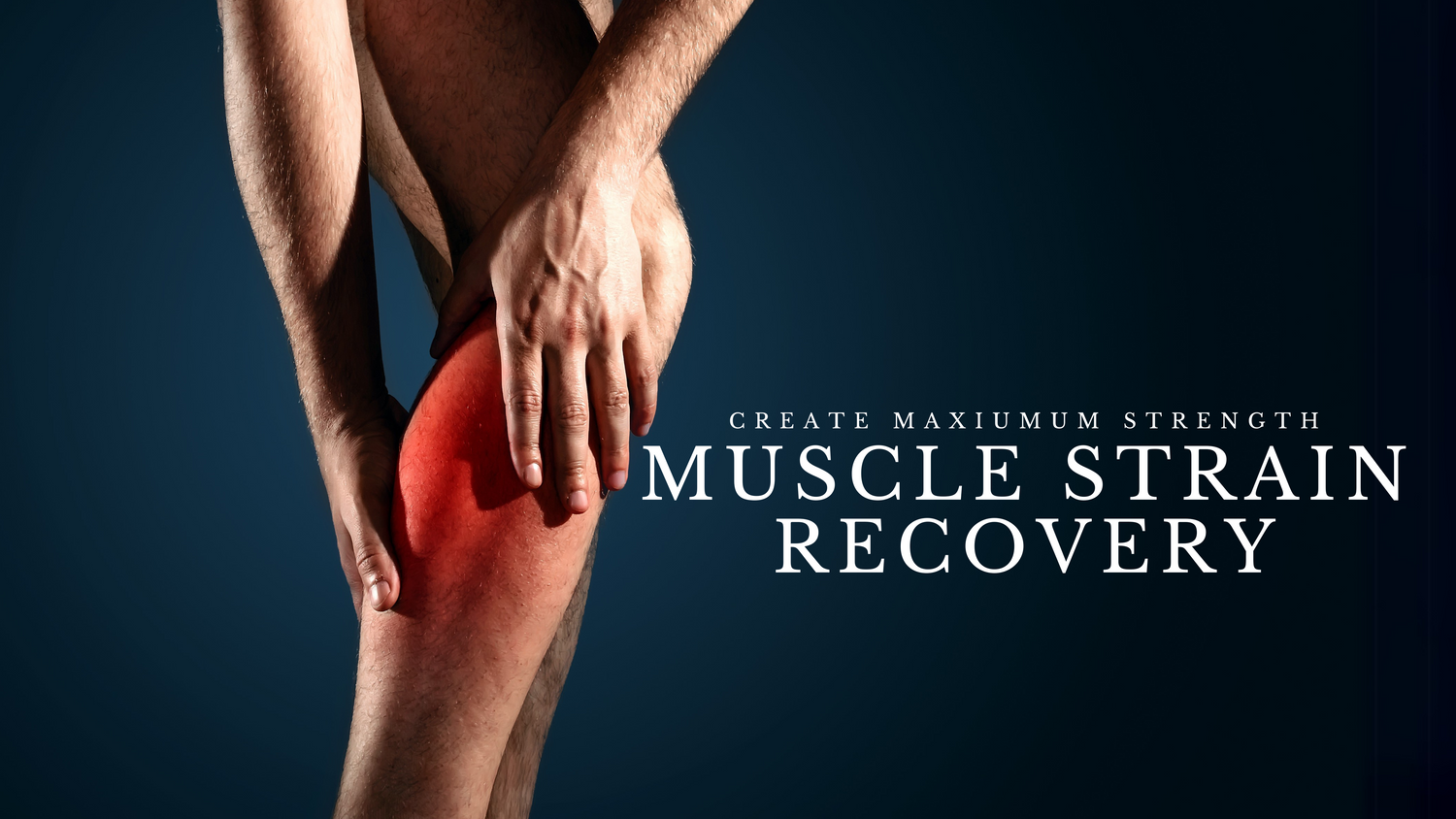Training hard is essential to achieving fitness goals, but recovery is where the magic happens. When your muscles are pushed to their limits, they need rest, nutrition, and often targeted supplementation to repair and grow stronger. If you’ve been searching for practical ways to speed up muscle strain recovery, you’re in the right place. Let’s explore what muscle strain is, and how you can effectively speed up your muscle recovery so you can grow into your strongest self and achieve your maximum strength and ability utilizing proper nutrition
Inhumanity Of Modern Life
Due to the consequences of our industrial age, most people do not concern themselves with muscle recovery. They sit down all day at work, sit down and drive home, then sit down to relax and watch TV before going to bed. This is not how human beings were designed to live. Humans are built to be active. We are designed to run, jump, lift, hunt, and fight.
Our bodies have mechanisms that help us adapt to these strenuous activities. When you work hard and feel muscle fatigue, you are using your body as it was designed to be used. When you work hard and feel muscle fatigue, you are using your body as it was designed to be used.
When you push yourself and are active like you should aim to be, this can often lead muscle soreness, or worse yet a muscle strain which if you do not prioritize your muscle recovery, could lead to further injury. Muscle recovery is the vital process that allows your body to adapt to these challenges, making you stronger, faster, and more resilient. By understanding and supporting this process, you can embrace your potential and thrive in a world that often works against our physical nature.

A person can feel weighed down by the all the sedentary challenges of contemporary living in modern life
Muscle Strain Recovery: Unlock The Power of Rest & Nutrition
Training hard and pushing your limits is a cornerstone of personal growth and fitness. But what happens when those sore muscles or minor strains slow you down? The secret to speeding up muscle strain recovery lies not just in rest but in proper nutrition—and magnesium may be the missing piece you need to bounce back faster and stronger. Let’s explore how magnesium plays a pivotal role in muscle strain recovery and how you can incorporate it into your routine
The Physiological Basis of Training: Stress and Recovery
To truly understand recovery, we first need to grasp the basics of training. The two core aspects of training are stress and recovery, a principle that has been recognized since ancient times. Understanding how stress and recovery impact muscle health is key to optimizing muscle recovery.
Consider Milo of Croton, an athlete from Ancient Greece, who became legendary for his strength. His secret? Carrying a growing calf every day until it became a full-grown bull. This is a perfect example of progressive overload, a concept critical for enhancing muscle recovery and growth. The progressive overload—gradually increasing stress—helped Milo grow stronger over time.
Milo Of Croton is the poster child for progressive overload
This concept applies to all types of training. Stress, whether it’s lifting heavier weights or trying new movements, challenges the body to adapt. However, stress alone is detrimental—it weakens muscles, overloads the nervous system, and tires your body. The magic happens during recovery, when the body over-recovers and becomes stronger to handle similar stress in the future. Without proper recovery, stress leads to injury, fatigue, and diminished performance.
How Muscle Recovery Works (and Why It’s Key for Injury Recovery)
Recovery has two essential components:
- Rest: Getting 7–8 hours of quality sleep and avoiding excessive strain while the body rebuilds itself.
- Nutrition: Providing the body with energy and building materials, such as protein, vitamins, and minerals, to repair and strengthen tissues.
The process of recovering from muscle strain or injury mirrors the principles of training recovery. When you’re injured, your body needs rest and nutrition to repair and rebuild. This means that the same practices that make you stronger after workouts—like getting quality sleep, staying hydrated, and eating a nutrient-rich diet—apply to recovery from physical injuries as well.
In both cases, the body uses energy and nutrients to repair muscle fibers, rebuild tissues, and replenish energy stores. Magnesium, for example, an often-overlooked nutrient, plays a critical role in this recovery process.
Why Supplements Matter for Muscle Recovery
Modern diets often lack sufficient nutrients to fuel recovery. Industrial farming and food processing have depleted essential minerals and vitamins, leaving gaps that supplementation can bridge. As highlighted in our blog "Why Take Supplements", modern food systems fail to meet our nutritional needs due to soil depletion and nutrient loss in processing. Supplements not only replenish these vital nutrients but also provide targeted benefits that accelerate muscle repair and reduce soreness, ensuring your body has what it needs to thrive.

The quality of supplements you take are just as important as anything else
The Role of Key Supplements in Recovery
1. Magnesium: The Muscle Recovery Powerhouse
Magnesium plays an irreplaceable role in recovery:
- Enhances blood circulation for efficient oxygen and nutrient delivery to muscles.
- Regulates electrolyte balance, preventing cramps and prolonged soreness.
- Converts food into ATP (energy), supporting faster recovery.
- Promotes relaxation and better sleep, critical for muscle repair.
For more details on how magnesium supports recovery, check out our blog "Benefits of Magnesium".
2. Glycine: Enhancing Sleep and Repair
Glycine, the simplest amino acid, is essential for:
- Improving sleep quality, a cornerstone of recovery.
- Reducing inflammation and oxidative stress in muscles.
- Stimulating the production of collagen, which strengthens connective tissues.
- Supporting protein synthesis, directly aiding muscle repair and growth.
Learn more about glycine’s benefits in our blog "What is Glycine"
3. Electrolytes: Optimizing Hydration
Supplementing high quality electrolytes are vital for cellular function:
- Quality electrolytes provide a perfect balance of sodium, potassium, and magnesium, crucial for maintaining hydration and preventing dehydration-related muscle fatigue.
- They regulate nerve signals and muscle contractions, reducing cramping and ensuring smooth recovery.
- Ideal for replenishing electrolytes lost during intense workouts.
Learn more about the importance of electrolytes in our blog "What Are Electrolytes".
4. Taurine: Reducing Inflammation and Boosting Strength
Taurine is a semi-essential amino acid with diverse benefits:
- Acts as a powerful antioxidant, reducing inflammation and oxidative stress.
- Enhances muscle contractions and force production, aiding recovery and performance.
- Supports mitochondrial function, boosting cellular energy production.
Learn more about Taurine’s benefits in our blog "What is the Taurine in Energy Drinks?".
5. Astaxanthin: The Antioxidant Ally
While primarily known for its skin and eye health benefits, astaxanthin contributes to muscle recovery by:
- Neutralizing free radicals produced during intense exercise, preventing muscle damage.
- Supporting faster recovery between workouts by reducing inflammation.
- Enhancing endurance by improving mitochondrial efficiency.
Learn more about its benefits in our blog "What is Astaxanthin".
6. Niacin: Supporting Circulation and DNA Repair
Niacin (Vitamin B3) aids recovery by:
- Improving blood flow and oxygen delivery to muscles.
- Supporting DNA repair, critical for tissue regeneration after strain.
- Enhancing energy production through NAD+ synthesis.
For more about the benefits of Niacin, check out our blog "What Does Niacin Do?".
7. Bison Liver Capsules: A Nutrient-Dense Superfood
Rich in bioavailable nutrients, this powerhouse provide:
- High levels of iron, zinc, and B vitamins essential for energy production and muscle repair.
- Natural anti-inflammatory properties that reduce soreness.
Learn more about the benefits of Bison Liver Capsules in our blog "Beef Liver vs. Bison Liver: Who is King?".
How to Integrate These Supplements into Your Routine
If you want an idea of how these various supplements can be incorporated into your routine, read on. The following suggestions are tailored to optimize the benefits of each supplement while ensuring safety and compatibility. As always, please consult a doctor before making any drastic changes to your nutrition or activity levels.
- Morning: Begin your day with electrolytes to rehydrate after sleep. A balanced blend of sodium, potassium, and magnesium can set the stage for optimal muscle function throughout the day. (Not to brag, but SolSupps Sol Salts is the BEST electrolyte formula out there)
- Pre-Workout: Incorporate Taurine to enhance muscle contractions and mitochondrial energy production.
- Post-Workout: Replenish lost nutrients with a nutrient-dense option like Bison Liver Capsules, which supply essential vitamins and minerals to aid recovery. Adding electrolytes post-workout also helps restore balance after intense sweating.
- Evening: Wind down with Magnesium and Glycine. Magnesium supports relaxation and reduces cramping, while Glycine promotes restorative sleep by calming the nervous system. For those using Niacin, taking it at night can reduce discomfort from the flush, as it’s less noticeable during sleep.
- Additional Notes: Supplements like Astaxanthin can be taken with meals for better absorption, offering antioxidant benefits to reduce inflammation and support endurance. If you are integrating multiple supplements, ensure proper spacing and follow recommended dosages for optimal results.
Let Us Support Your Recovery
If you scrolled this far, let us help you even further. The right supplements, paired with a strong routine, can elevate your recovery and performance. Our mission is delivering quality nutrition and the best supplementation to support your fantastical journey. Take us with you on your quest to do amazing things and become your strongest self.
Try the SolSupps’ supplements we mentioned here today to support your recovery journey.




1 comment
Jonas
I loved this. Good post. May the Sol never stop Supping!
Leave a comment
All comments are moderated before being published.
This site is protected by hCaptcha and the hCaptcha Privacy Policy and Terms of Service apply.